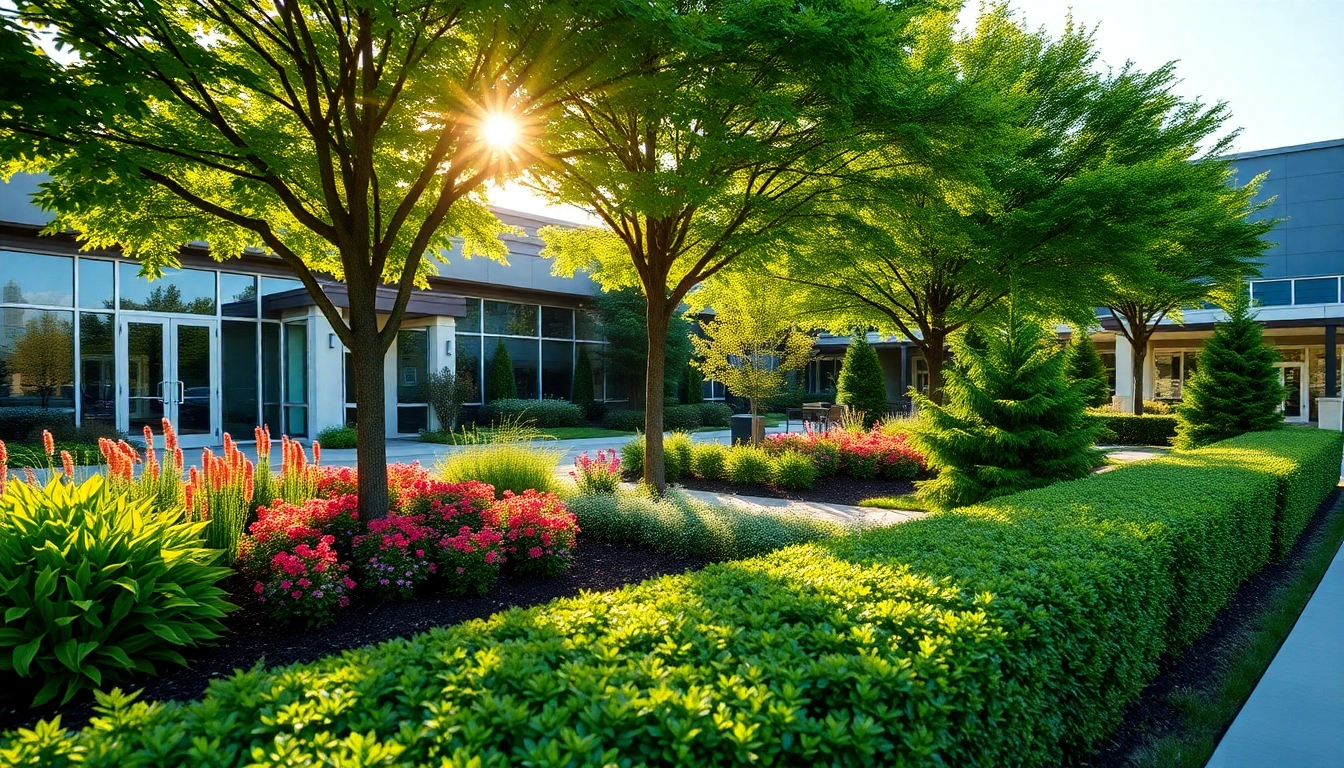Understanding the Role of Commercial Landscaping Contractors
What They Do and Why It Matters
Commercial landscaping contractors play an essential role in creating and maintaining the aesthetic and functional aspects of outdoor spaces in business environments. They are responsible for designing landscapes that not only create a positive first impression but also promote a successful environment for customers and employees alike. Their tasks range from installing plants and trees to developing intricate irrigation systems and hardscapes. In essence, they transform the mundane grounds of commercial properties into inviting, functional, and visually appealing spaces.
The importance of hiring experienced commercial landscaping contractors cannot be overstated. Effective landscaping can increase property value, enhance the functionality of outdoor spaces, and even promote sustainability through the choice of native plants and eco-friendly practices. Furthermore, well-maintained landscapes boost curb appeal, which can be vital for attracting customers and clients.
Benefits of Hiring Commercial Contractors
Hiring a professional commercial landscaping contractor provides numerous benefits that can significantly impact a business’s operations and image. These benefits include:
- Expertise and Knowledge: Professionals bring a wealth of knowledge regarding local climate conditions, soil types, and plant selections that thrive in specific environments.
- Time Savings: Outsourcing landscaping tasks frees up time for business owners and staff to focus on their core activities, enhancing productivity.
- Quality Worksmanship: Professional contractors adhere to strict standards and regulations, ensuring high-quality results that may be difficult for untrained individuals to achieve.
- Long-term Maintenance Plans: Many contractors offer ongoing maintenance plans, which can save time and money while ensuring that landscapes remain vibrant year-round.
Key Skills and Qualifications
When evaluating potential commercial landscaping contractors, it is vital to consider their skills and qualifications. Important skills include:
- Design Skills: The ability to envision and create functional, attractive landscapes is crucial.
- Knowledge of Plant Species: Understanding which plants thrive in specific climates and settings is necessary for optimal landscaping.
- Technical Skills: Proficiency in operating machinery and tools used in landscaping and maintenance.
- Project Management: The ability to manage budgets, timelines, and resources efficiently is key to delivering successful projects.
Evaluating Commercial Landscaping Contractor Options
Assessing Experience and Portfolio
Evaluating a contractor’s experience and portfolio is a critical step in the hiring process. A comprehensive portfolio showcases their past projects, illustrating their range and expertise. Ask for examples of similar projects they have completed successfully, and consider visiting those sites if possible. In addition, client testimonials and reviews can provide valuable insights into their reliability, communication, and overall customer satisfaction.
Understanding Pricing Structures
Pricing for commercial landscaping services can vary widely based on project complexity, location, and the specific services offered. It’s essential to get detailed quotes from multiple contractors, which should include breakdowns of materials, labor, and any ongoing maintenance costs. Understanding these components will enable you to make an informed decision and avoid unexpected expenses down the line.
Red Flags to Watch For
There are several red flags that potential clients should watch for when selecting a commercial landscaping contractor. These include:
- Lack of License or Insurance: Ensure that the contractor is licensed and insured to operate in your area. This protects you from liability in the event of accidents or damages.
- Vague Contracts: Contracts should be clear and detailed, outlining the scope of work, timelines, and costs. Avoid contractors who dismiss the importance of a well-defined contract.
- Poor Communication: A contractor’s responsiveness during the initial consultation can be a sign of how well they will communicate throughout the project.
Designing Your Landscape with Professionals
Creating Aesthetic and Functional Outdoor Spaces
Professional landscaping goes beyond mere decoration; it involves creating spaces that serve both practical and aesthetic purposes. Working closely with a contractor who understands your vision can lead to the development of areas that encourage gatherings, facilitate movement, and enhance the property’s overall functionality. They can help incorporate features like walking paths, seating areas, and decorative elements that guide visitors through the landscape.
Incorporating Sustainable Practices
Sustainability is an increasingly important consideration in commercial landscaping. Contractors can suggest practices that conserve water, reduce waste, and utilize native plants that require less maintenance and resources. For example, xeriscaping, which emphasizes water-efficient landscaping techniques, can substantially reduce water consumption. Discussing these options with your contractor can lead to an environmentally friendly landscape that aligns with modern business practices.
Leveraging Technology in Landscape Design
The integration of technology into landscape design, such as 3D rendering and design software, can enhance visualization for clients and contractors alike. This tech-savvy approach provides a clearer picture of how a final design will look before any physical work begins, allowing for adjustments based on client feedback. Additionally, the use of smart irrigation systems can ensure landscapes remain well-watered while conserving resources, further emphasizing the importance of innovation in landscaping.
Best Practices for Maintenance and Care
Seasonal Maintenance Tips from Contractors
Regular maintenance is vital to preserving the investment made in commercial landscaping. Contractors typically recommend seasonal tasks which can include:
- Spring: Early inspections for winter damage, flowering plant installations, and mulch application.
- Summer: Regular watering schedules, pest management, and lawn maintenance.
- Fall: Leaf removal, preparing plants for winter, and planting perennials.
- Winter: Protecting young trees and shrubs from frost and snow damage.
Common Issues and Solutions
Even the best-designed landscapes can encounter common issues, such as pest infestations, diseases, and dry patches in lawns. Identifying these problems promptly and applying appropriate solutions is key to keeping landscapes healthy. Contractors can provide insight into managing these problems, along with the necessary treatments, monitoring techniques, and preventative measures to avoid them in the first place.
How to Communicate Effectively with Your Contractor
Effective communication with your commercial landscaping contractor is vital to ensuring that your vision is accurately realized. Regular check-ins, clear feedback, and setting expectations from the start will help guide the project. It’s also important to maintain an open dialogue regarding budgetary constraints and potential adjustments throughout the project timeline to foster a proactive relationship that benefits both parties.
Measuring Success in Commercial Landscaping
Key Metrics to Track Curb Appeal
Assessing the curb appeal of your commercial property can involve several metrics, including the condition of landscaping features, diversity of plant life, visual harmony, and upkeep of hardscapes like pathways and parking areas. Getting feedback from customers and employees can also provide insight into how the landscape impacts business perceptions.
Client Satisfaction and Feedback
Client satisfaction should be a top priority post-project. Gaining feedback through surveys or direct communication can help identify areas for improvement and gauge overall contentment with the landscaping. This practice not only enhances future projects but can also strengthen client relationships.
ROI from Professional Landscaping Investments
Investing in professional landscaping can yield a significant return on investment (ROI) when done correctly. Research shows that well-designed landscapes can increase property values by as much as 20% and improve energy efficiency in buildings. Tracking these financial benefits against the costs of landscaping services is essential to quantify the return on your investment and inform future decisions.



